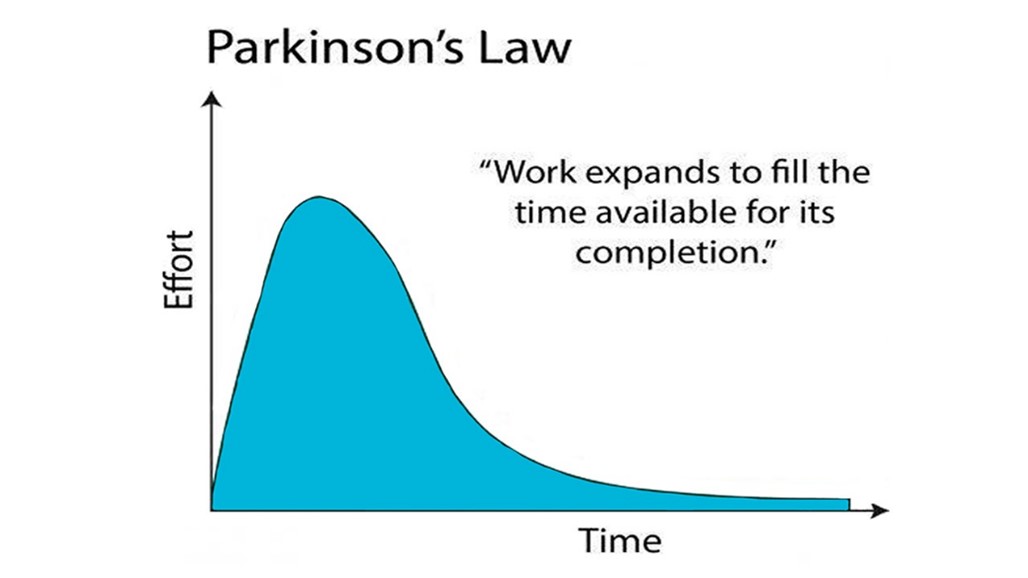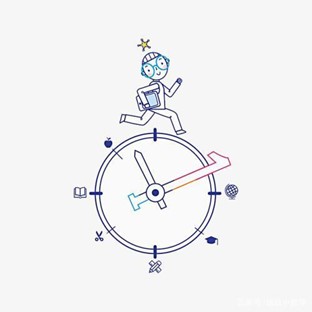
Do you often find yourself procrastinating or struggling to meet the deadline?
You may have a list of tasks need to accomplish, but instead of working on them, you spend hours mindlessly scrolling through social media or doing anything but the work that needs to be done? You know that you have a deadline coming up, but it feels distant, and you can't seem to motivate yourself to start working?
Does this sound familiar to you?
Then you may become a victim of Parkinson's law.
But don't worry! In this article, let's learn more about Parkinson's law time management and how to avoid it to get more things done.
In this article

Parkinson's Law, first noted by C. Northcote Parkinson in 1955, is a principle that suggests work expands to fill the time available for its completion.
In other words, if a task has a deadline, individuals will utilize the total time assigned to complete it—no matter how much or how little needs to be done. Although Parkinson's Law may not be entirely accurate every time, it is an excellent psychological tool when taking on new time management projects.
Parkinson's Law can significantly impact people's productivity in various ways. Here are some examples:
- Procrastination: When people have more time available to complete a task, they tend to procrastinate and delay getting started. As a result, they might not begin working on the task until the deadline is looming, leaving them with less time to complete it.
- Reduced focus: When people have a lot of time to complete a task, they might get easily distracted and lose focus. This could be due to a lack of urgency as they feel that there is plenty of time left to complete the task.
- Increased workload: When people take longer to complete a task, they might end up with a larger workload. Parkinson's Law can cause individuals to expand the work to fill the extra time, leading to an increase in work to be done.
- Low-quality work: When people take longer to complete a task, they might rush through it at the last minute. This can lead to lower-quality work that can negatively affect productivity.

1..Set clear deadlines - Setting clear deadlines helps to create a sense of urgency and accountability, which helps avoid procrastination.

- Identify the task: The first step is identifying the task at hand. Break down the task into smaller components to ensure you can accurately estimate the time needed to complete the task.
- Determine the priority: Once you've determined the task, assess its priority level. Set deadlines for the most important tasks requiring the most attention.
- Consider the complexity of the task: Take note of how complex the task is and estimate how much time it will take to complete it.
- Be realistic: You should also be realistic about what you can achieve. Setting unrealistic deadlines can cause you to feel stressed and unmotivated, leading to procrastination.
2..Prioritize tasks - Prioritizing tasks helps individuals focus on the most important and urgent tasks while ensuring they are completed first, you could:
- Make a comprehensive list;
- Consider deadlines and task dependencies;
- Break down large tasks;
- Rank tasks based on value;
- Allocate time and resources;
- Be flexible and adaptable;
- Commit to completing priorities;
3..Break larger tasks into smaller ones - Breaking large tasks into smaller, more manageable tasks can make them seem less overwhelming and make them easier to handle.
4..Eliminate distractions - Removing distractions such as social media, unrelated websites, and other non-work-related activities can help individuals focus better and improve productivity. Here are some suggestions on how to avoid distraction at work:
- Create a designated workspace: Set up a comfortable and clutter-free workspace that is reserved only for studying or working. This will signal your brain that it's time to focus on the tasks at hand.
- Eliminate digital distractions: Turn off notifications on your devices, close irrelevant tabs on your browser, and consider using browser extensions or apps that help block distracting websites.
- Time management: Set specific time blocks for focused work or study, followed by short breaks. Techniques such as the Pomodoro Technique can be quite helpful in this regard.
- Prioritize tasks: Use a to-do list to prioritize tasks and tackle them one at a time. This will help you maintain focus and avoid becoming overwhelmed.
- Organize your work materials: Keep your study or work materials organized, so you don't waste time searching for them when needed. This also helps you stay focused on your current task.
- Limit multitasking: Focus on one task at a time to avoid splitting your attention between multiple tasks, which can impair productivity and focus.
- Exercise and stay healthy: Regular exercise, a balanced diet, and sufficient sleep can help improve your concentration and focus during work or study sessions.
- Use noise-canceling headphones: To minimize auditory distractions, use noise-canceling headphones or earplugs, or listen to white noise or instrumental music to help maintain focus.
- Establish a routine: Create a consistent work or study routine to build habits that support focus and productivity.
5..Utilize the Pomodoro Technique - This technique involves working in short bursts of intense focus with short breaks in between. This helps avoid burnout and enhances productivity.
6..Avoid multitasking - Multitasking can lead to decreased productivity and lower quality work. Focusing on one task at a time can help improve efficiency and overall quality of work.
7..Practice time blocking - This involves blocking out specific times during the day for different tasks. This helps create a routine and ensures each task has a designated time and priority.
8..Use a time-tracking software- Time-tracking software and apps can help individuals keep track of how much time they spend on each task, allowing them to allocate their time better and identify areas where they can improve their productivity.
Part 4 FAQs
Q: What is the example of Parkinson's Law in time management?

- Procrastination: When given a deadline of two weeks for a project that can actually be completed in just a few days, it is common to delay starting the work until it is closer to the deadline, resulting in poor time management.
- Overplanning: When given too much time to plan or prepare, people may spend more time than necessary on minor details, causing them to lose sight of the larger goal.
- Meetings: When a meeting is scheduled for an hour, even if the agenda can be covered in 30 minutes, attendees will often find ways to fill the entire hour, making the meeting less efficient.
- Emails: When allowed unlimited time to check and respond to emails, an individual may spend more time on this task than necessary, whereas setting aside specific time for this task can lead to more efficient email management.
- House chores: When given an entire weekend to complete household chores, the tasks may expand to fill the whole timeframe, whereas setting aside specific time slots can lead to completing the assignments more efficiently.
- Social media usage: Without setting boundaries for social media usage, it can consume a significant amount of time. However, allotting a specific time for using social media can help mitigate this issue.
- Small tasks: Leaving small tasks unchecked can lead to them taking up more time than necessary. Incorporating these tasks into a specific time block makes their completion more streamlined and efficient.
Overcoming Parkinson's Law is essential for improving time management and productivity. By implementing the strategies outlined in this article, you can minimize the impact of Parkinson's Law on your daily life and make better use of the available time. Remember to set realistic deadlines, prioritize tasks, maintain focus, and monitor your progress to optimize your time management skills and achieve your goals.


